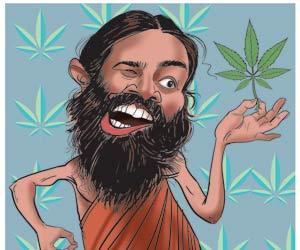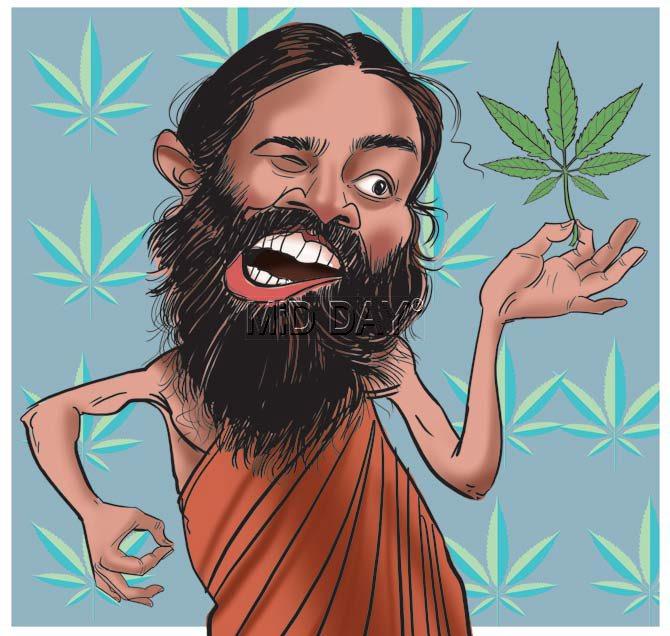Baba Ramdev's company isn't wrong in seeking legalisation of marijuana in India, as the drug is known to deliver high profits too


Illustration/Uday Mohite
ADVERTISEMENT
![]() One can agree with Baba Ramdev's burgeoning business empire's call for legalising marijuana. His other antics are less than impressive: his yoga jogging alongside BJP president Amit Shah is something you can't unsee; his politics are conservative and antediluvian; and he himself comes across as unctuous. Yet, his view on weed is progressive, even if driven by commercial greed.
One can agree with Baba Ramdev's burgeoning business empire's call for legalising marijuana. His other antics are less than impressive: his yoga jogging alongside BJP president Amit Shah is something you can't unsee; his politics are conservative and antediluvian; and he himself comes across as unctuous. Yet, his view on weed is progressive, even if driven by commercial greed.
The government has considered legalising marijuana, following the trend in the United States, where during Barack Obama's presidency, state after state slowly began to legalise marijuana. Despite current President Donald Trump's attorney-general's decision to get tough on marijuana sale and usage, the horse has bolted from the stable: liberal states are not rolling back laws that have given them a revenue bonanza, and are instead toughening local laws to forestall any federal encroachment or enforcement.
During the UPA regime, the ministries of home affairs and social welfare were each examining the viability of legalising marijuana in India. The former wanted to divert anti-trafficking resources towards synthetic drugs, e.g. opiate derivatives like heroin, and methamphetamine.
These hard drugs are increasingly a menace for state police. Some officials have, in files, marked marijuana out as an organic narcotic that Indians have been consuming for millenia; many police officers have come around to the view that it is a waste of resources to chase down its sales, and that its sole purpose for much of law enforcement is to provide an easy means of lining the pockets of corrupt beat constables.
Additionally, the social welfare ministry had weighed in with inputs from over 200 non-governmental organisations working in the vital field of de-addiction.
This tries to tackle the problem of consumers' drug addiction, instead of frittering away energy fighting the suppliers. In the US, the futile "war on drugs" is now an "opioid epidemic" on which interdiction is focussed. The feedback from Indian NGOs is that the "synthetic" drug epidemic is more lethal and more alarming than that of "organic" drugs. Their workload would ease by orders of magnitude were marijuana to be legalised.
Culturally, cannabis use unites India as much as Lata Mangeshkar's singing. The great fiery Tamil nationalist poet Subramania Bharati was apparently fond of the weed. Kashmiris had a hashish tradition where, for the two wintry months of being snowed in their houses they would spend their time zonked out of their minds. This practice has understandably vanished (almost) during the past three decades of insurgency and repression - another good reason to pursue conflict resolution in J&K.
For foreigners, especially Israelis who have finished their mandatory military service and have come for the rite of passage India experience, Himachal Pradesh is the go-to place for the world's best hashish: Malana cream, which is listed at the top of the hash menu in Amsterdam's bars. In Odisha, the police refused to raid hundreds of acres of the marijuana crop that the central government had spotted via satellite imagery - because it was in Maoist-controlled territory (indicating a source of revenue for the rebels). India's famous fantasy factory, right here in Mumbai, is powered by marijuana. You can find endless examples from every nook and cranny of our nation.
As in everything else, the Baba's empire would cite our traditional and cultural continuity to justify its commercial goals. Weed is lucrative, going by the US experience. Financial analysts say that the cannabis business in the US last year was $9 billion – equivalent to, according to CNN, the entire snacks industry or the child diapers industry – and by 2021 it is slated to go as "high" as $21 billion. And this is when only nine states have fully legalised it (30 states allow the use of medical marijuana). When I visited the US last April, I attended my brother's art exhibition and he slipped my sister and I a gummy bear made of cannabis oil (I can't figure out how she drove us back to Brooklyn from lower Manhattan; what a long, strange trip it was). When my daughters visited from California during Christmas week, the elder one slipped me a Hashish vape. You'd be a dope not see how obviously lucrative the drug business is.
The initiative to legalise cannabis lost steam in 2014. Possibly by the patriarchs currently remaking India worry that women will get the interminable giggles if they smoke up; the Goa chief minister has already pointed out his concern with the fact that "girls drink beer". It makes more sense, however, that a "distraction sarkar" which blows up cultural non-issues to camouflage its economic incompetence should want its citizenry to be stoned out of its mind. Or, at the very least, Baba Ramdev's cannabis produce could alone wipe out our trade deficit with China (remember the Opium Wars?). It is high time that India legalised marijuana.
Aditya Sinha's crime novel, The CEO Who Lost His Head, is available now. He tweets @autumnshade. Send your feedback to mailbag@mid-day.com
Download the new mid-day Android and iOS apps to get updates on all the latest and trending stories on the go
 Subscribe today by clicking the link and stay updated with the latest news!" Click here!
Subscribe today by clicking the link and stay updated with the latest news!" Click here!






